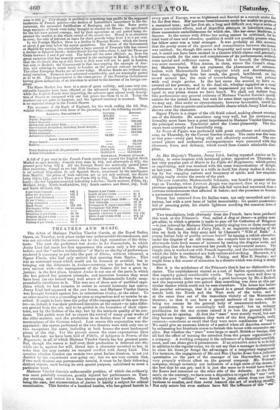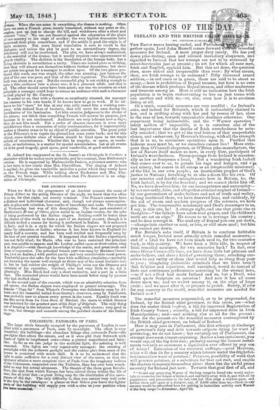Two translations, both obviously from the French, have been produced
this week at the Princess's. One, called A Day at Dover—a paltry mea- gre affair, in which a grisette is made to pass off for-Catherine of Braganza —is just relieved by Madame 'Dillon prettily singing two or three medioc,re songs. The other, called 4 Fairy Tale, is an ingeelousseudering of the idea set forth in the fairy story told by CliaU001"8 "Wife a Bath." A young Italian lady of quality amuses herself by teasing a rakish chevalier: under the disguise of an old wC11111111, elle compels him to marry her, and afterwards finds fresh means of torment by casting the disguise aside, and pretending that she has recovered her youth by supernatural means. The simple idea is worked out with French ingenuity, and the incidents through which the fable is conducted are both various and striking. Moreover, it is well played by Mrs. Stirling, Mr. J. Vining, and Miss E. Stanley; and might form a fair source of attraction in a theatre which was doing a steady business.
But it is the misfortune of the:Princess's that it has no distinctive cha- racter. The establishment started as a sort of Italian operahouse, and in that capacity gained considerable credit. The operas were well done up to a certain mark: there was generally a good burlesque by Mr. .k Beckett, and the important point was gained that something was done at this par- ticular theatre which could not be seen elsewhere. The house has besides this peculiar advantage that it is placed in a grand thoroughfare, com- mands both the North and the West ends of the town, and is at the same time out of the immediate vicinity of the Westminster theatres; so that it can have a special audience of its own, without being too remote for the general body of amusement-seekers. As an operahouse, it was exceedingly well managed; but an unhappy predilection for the star system caused it to lose the groluId which it occupied on its opening. At first the "stars" were merely vocal, but soon they became tragic; sometimes they were of the firat magnitude, really., eminent—sometimes so small that they were mere seurblances of "stars. We Gould give an accurate history of a period when all America seemed to be exhausting her-histrionic-stores to furnish this house with successive sup- plies. But whether the " stars" were large or small, Britisher foreign, they all bad the effect of turning the attention from the proper organization of a company. A working company is the substance of a theatrical establish- ment, and can alone give it permanence. If an attractive actor is to be had, in addition to the regular corps, we do not say that a manager is obstinately' to clese his doors :or forego the advantages of a temporary engsgemeut For instance, the engagement of Mr, and Mrs. Charles Kean was a judicious speculation on the part of the manager of the Haymarket, and wes very properly without effect on the general company. Mr. Webster's company, though certainly not indicative of a high state of the drama, i.s, the best that he can get; and it is just the same as it would have leen it the Keane had remained on the other side of the Atlantic. At the Prin- cess's, on the contrary, we have seen a disposition to regard the "star while the poor " utilities " were forced to jump about from one line of business to anothee, and thus never leas-zed the art of workiag WRAY; Not only actors but even authors have felt the influence of this '5t3 rstem. When the one actor is everything, the drama is nothing. Often have we seen a French piece, merely translated, without any point or dis- cretion, put up just to change the bill, and withdrawn after a short and obscure "run." We are not fanatical against the adaptation of the plays or one country to the stage of another: the very highest dramatists have borrowed their plots somewhere, and if the article is good the origin is of little moment. But mere literal translation is sure to result in flat dialogue; and unless the plot be good to an extraordinary degree, the deficiency will not be overlooked. The plot, we have always maintained, is the essential of the drama; but it mostly requires some appurtenance to give it vitality. The skeleton is the foundation of the human body, but a living skeleton is nevertheless a rarity. There are indeed plots 1:0 striking, that they will almost act themselves without further decoration; but these are prizes too great for a manager to reckon upon. Of the two pieces pro- duced this week, one was stupid, the other was amusing; just because the plot of the one was poor, and that of the other ingenious. The dialogue of both was about on a par. But the successful play is not striking enough to turn a thin audience into a closer one; it is a pleasant affair, and that is all. The other should never have been acted; nor can we conceive on what principle a manager could hope to amuse an audience with snob a character as that played by Mr. Conway.
It seems to us, that with a theatre so excellently situated, the manager has success in his own hands, if he knows how to go to work. If he ad- heres to his "stars," let him at any rate rally round him a working com- pany, with defined lines of business, that will serve his turn during the occultation of his luminaries. Let him exercise judgment in the choice of his pieces; not think that everything French will answer its purpose, just because it is not condemned. Audiences are very tolerant now-a-days; they do not hiss much. But a series of obscure successes is even more mischievous than a succession of noisy condemnations, for it imperceptibly makes a theatre cease to be an object of public attention. The great point at the Princess's is to regain the ground lost some years back; and for this object, some definite class of drama should be fixed upon as the staple article of entertainment. Whether this be tragedy, or opera, or vaude- ville, ormelodrama, is a matter for special consideration, but at all events let it be good tragedy, good opera, good vaudeville, or good melodrama.



























 Previous page
Previous page